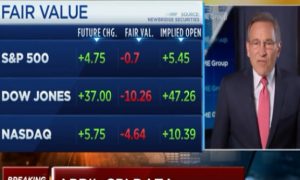There’s no such thing as a sure thing on Wall Street, but almost all the research out there shows that investors who buy and hold blue-chip stocks for the long haul make money – and more importantly, make more money than people who actively trade in and out of positions.
Read More : Linda C. Black Horoscopes: November 14
That’s in part because it’s impossible to time market crises or market opportunities perfectly. But it’s also because the nature of U.S. stocks is that the big companies always get bigger and more entrenched over time. While a few risky startups may come out of left field as “disruptors,” the reality is that most of the leaders out there are many decades old with no sign of slowing down.
If you want to get ahead, then, go big and go long term with some of the following investment options. All are mega-cap stocks with valuations north of $70 billion at present, and all offer above-average dividends that ensure they have the profits to drive shareholder value for many years to come.
| Stock | Dividend Yield |
| Altria Group Inc. (ticker: MO) | 9.8% |
| Broadcom Inc. (AVGO) | 2% |
| Johnson & Johnson (JNJ) | 3.2% |
| JPMorgan Chase & Co. (JPM) | 2.9% |
| NextEra Energy Inc. (NEE) | 3.4% |
| Prologis Inc. (PLD) | 3.4% |
| T-Mobile US Inc. (TMUS) | 1.8% |
Altria Group Inc. (MO)
Dividend yield: 9.8%
Market capitalization: $71 billion
Altria is the tobacco giant behind Marlboro cigarettes, Black & Mild cigars and Skoal smokeless tobacco, among a host of other products. These items aren’t particularly healthy, but given how well known the risks are, it’s not like consumers have been duped. And for better or worse, tobacco sales remain reliable – and modest price increases have helped Altria offset any slow bleed in its loyal customer base. From an income perspective, it’s hard to find a better stock out there than MO as it has a track record of more than 50 consecutive years of dividend increases, and its nearly double-digit payout is reason alone to consider it if you’re a patient investor in this stock for long-term income.
Read More : 4 Reasons It’s a Good Time to Buy a House Right Now
Broadcom Inc. (AVGO)
Dividend yield: 2%
Market capitalization: $376 billion
There are likely other tech stocks that are more recognizable to most investors, but Broadcom is definitely not a second-tier startup. It’s a top-five stock in the tech sector as measured by market cap, as well as one of the top five semiconductor firms globally when measured by revenue. For long-term investors, these internal components are a much safer bet than banking on the ups and downs of consumer tastes. It also offers more than just a nominal dividend, with an annual payout that is just under half of total earnings per share despite a yield that’s already higher than the typical S&P 500 component.
Johnson & Johnson (JNJ)
Dividend yield: 3.2%
Market capitalization: $354.9 billion
Johnson & Johnson is a health care leader that ranks as one the 20 largest U.S. stocks by market capitalization, and is one of just two firms with the tip-top AAA rating for corporate debt – Microsoft Corp. (MSFT) being the other company with that honor. J&J has a consumer health division that includes Tylenol and Band-Aid products, as well as vaccines like the COVID-19 shots many of us got a few years back, as well as prescription drugs to treat cancer and high-tech medical devices. Health care is one of the most reliable and recession-proof sectors out there – and that certainty has helped JNJ to string together more than 60 consecutive years of dividend increases for its shareholders.
JPMorgan Chase & Co. (JPM)
Dividend yield: 2.9%
Market capitalization: $419.3 billion
Entrenched giant JPMorgan Chase is a dominant force in the global financial sector. This megabank has roots dating back to 1799, and is currently the largest U.S. bank by assets. It has weathered a host of storms over that period – from the 2008 financial crisis, where it made a fire-sale purchase of the embattled investment bank Bear Stearns, to the more recent 2023 crisis, during which it acquired billion-dollar regional bank First Republic. If you want scale and staying power, JPM is the leader in the financial sector based on its history of turning past challenges into long-term opportunities.
NextEra Energy Inc. (NEE)
Dividend yield: 3.4%
Market capitalization: $112.3 billion
Read More:-6 Takeaways From Democrats’ Winning 2023 Election Night
Utility stocks like NextEra Energy have lagged lately as higher interest rates have increased borrowing costs for capital-intensive businesses that operate massive grids and power plants. But long-term investors who can look past the volatility of late may be drawn to the incredible stability that utilities generally offer – and NEE’s preeminent place as the largest publicly traded utility in the sector with a market cap of about $112 billion. Power is a necessity for businesses and consumers, so NextEra’s wide reach and strong baseline demand should make it all but a sure thing to be around for years to come.
Prologis Inc. (PLD)
Dividend yield: 3.4%
Market capitalization: $95.4 billion
While it may not have the name recognition of other companies on this list, Prologis is actually the largest stock in the entire U.S. real estate sector. You may not be familiar with it, however, since it’s a logistics giant specializing in real estate such as warehouses and industrial parks. This is an in-demand form of real estate given the rise of e-commerce and shipping hubs, and PLD is a key part of the global supply chain with 1.2 billion square feet of space across 19 different countries. It has long-term deals with clients including Amazon.com Inc. (AMZN) and FedEx Corp. (FDX), so it’s hard to imagine Prologis seeing widespread vacancies anytime soon. And since it’s structured as a real estate investment trust, or REIT, the company delivers 90% of its taxable income back to shareholders to provide generous and consistent dividends.
T-Mobile US Inc. (TMUS)
Dividend yield: 1.8%
Market capitalization: $169.9 billion
Read More:-6 Takeaways From Democrats’ Winning 2023 Election Night
Some investors have previously been under the impression that the U.S. wireless market included Verizon Communications Inc. (VZ) and AT&T Inc. (T) tied for first and T-Mobile as a distant competitor. However, TMUS is now the largest telecom by market capitalization, thanks to a timely mashup with Sprint in 2020 that allowed it to restructure and get competitive at the perfect time. Case in point: TMUS had only $100 billion or so in long-term debt at the end of last year, while Verizon had almost $140 billion and AT&T had almost $130 billion. A better balance sheet along with recent efficiencies will ensure TMUS remains relevant for many years to come in the telecom space. And its first dividend of 65 cents per share in November is further proof of that.
Copyright 2023 U.S. News & World Report



































